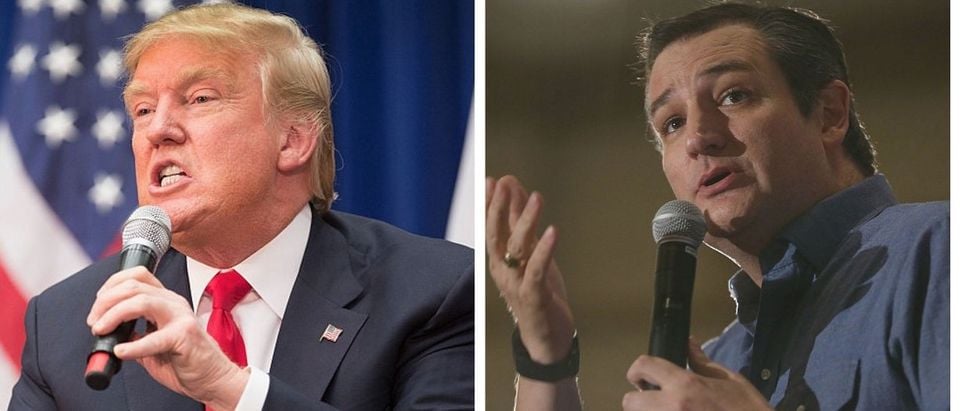Have you heard the rumors? Donald Trump’s presidential campaign is collapsing, and Ted Cruz is failing to garner significant support from the party establishment. Therefore, it’s virtually certain that neither man will become the GOP nominee. Instead, expect John Kasich and Marco Rubio to ride to the rescue, form a center-right “unity” ticket, and salvage the GOP’s hopes of beating Hillary Clinton in November.
That’s the news from some quarters of the GOP who still can’t stand the thought that Trump or Cruz is the likely Republican nominee. But now even the left-wing Huffington Post is joining the Trump-is-Dead chorus. HuffPo columnist Seth Abramson declared last week that a Kasich-Rubio ticket isn’t just a possibility – it’s a fait accompli. The GOP power brokers don’t want to lose the White House, and they’ve already gotten together to rig the outcome, he writes. In other words, the fix is in.
Abramson’s declaration must be reassuring to GOP poo-bahs who’ve had visions of fashioning their own version of a GOP “dream” ticket. They are the same ones who thought that throwing hundreds of millions of dollars at Scott Walker or Jeb Bush – and later Rubio — would derail the Trump steamroller. And some of these same people probably do think that their behind-the-scenes machinations can alter the fundamentals of the race – and displace the will of the voters.
They are in for a rude awakening – yet again.
To be sure, the odds of Trump winning an outright majority of the delegates probably did fall somewhat following the billionaire real estate mogul’s stinging defeat in Wisconsin and his failure to garner any delegates in the Colorado caucuses. Ted Cruz surely gained some momentum from these victories, and he is demonstrating an extraordinary ability to play the delegate game to his advantage.
But for all the media hype, none of these recent shifts has done much to halt Trump’s steady march to the nomination. Just look at the next six races in the delegate rich states of New York (95), Pennsylvania (71), Maryland (38), Connecticut (28), Delaware (16), and Rhode Island (19). Trump’s not just holding steady with a solid lead, he’s actually gained ground in recent weeks. Polls show him clobbering Cruz and Kasich in all six states. Three are winner-take-all and the other three are likely to award Trump the lion share their delegates.
All told, Trump will walk away with at least 200-210 delegates of the 267 delegates at stake in these six contests compared to 57-67 divided among the other two candidates. That would place Trump a total of 950-960 delegates, far ahead of the field, with just 270-280 more needed to win.
Looking ahead to May, Cruz may well win a few contests after these six – Indiana, for example, is a safe bet, and probably Montana — but Trump will almost surely take New Jersey, West Virginia and Oregon as well as Washington. Victories in these states will put Trump in striking distance of the magic number of 1,237. Even if he ends up short, there’s always California on June 7. California awards 15 delegates to the popular vote winner and assigns 3 delegates in each of 53 legislative districts – each, constituting in effect, a mini-primary. Trump may well win the state — he’s been leading f by high single digits for months — but he can count on winning a large number of districts, regardless. His total delegate haul, even if he loses, will almost surely put him over the top.
And what leads HuffPo or anyone else to think that Kasich is sufficiently popular in the party to displace Ted Cruz as its party standard-bearer, should Trump fall short? There is no evidence that Trump’s delegates would magically appear in the Kasich column – or the Rubio column for that matter. In all likelihood, Cruz would gain without completely displacing Trump. And as the balloting proceeded, there would be more not less pressure on Kasich to drop out and leave the contest to the two front-runners to sort out. Kasich or Rubio – if in play at all – would likely emerge as prospective VP candidates.
A Trump collapse? We’ve been hearing about this eventuality from the beginning of his entry into the race. But by April 26, less than two weeks from now, he will be in striking distance of the nomination and a good 400 delegates ahead of his nearest competitor, Ted Cruz, who will be mathematically eliminated as a first ballot victor. A Trump victory is not a fait accomplit and the race may not be declared officially over until the final ballots are counted on June 7.
But the bulk of the evidence suggests that the nominating contest is still the Donald’s to lose. To suggest that other scenarios are more likely – or worse, to declare them certain — is to engage in the kind of wishful – and divisive — thinking that is keeping the party from unifying. It is damaging the standing of the candidates most likely to take the fight to the Democrats in the fall. And worst of all, it insults the stated preferences of the voters, without whose passion and support for the GOP ticket, no victory is possible.


